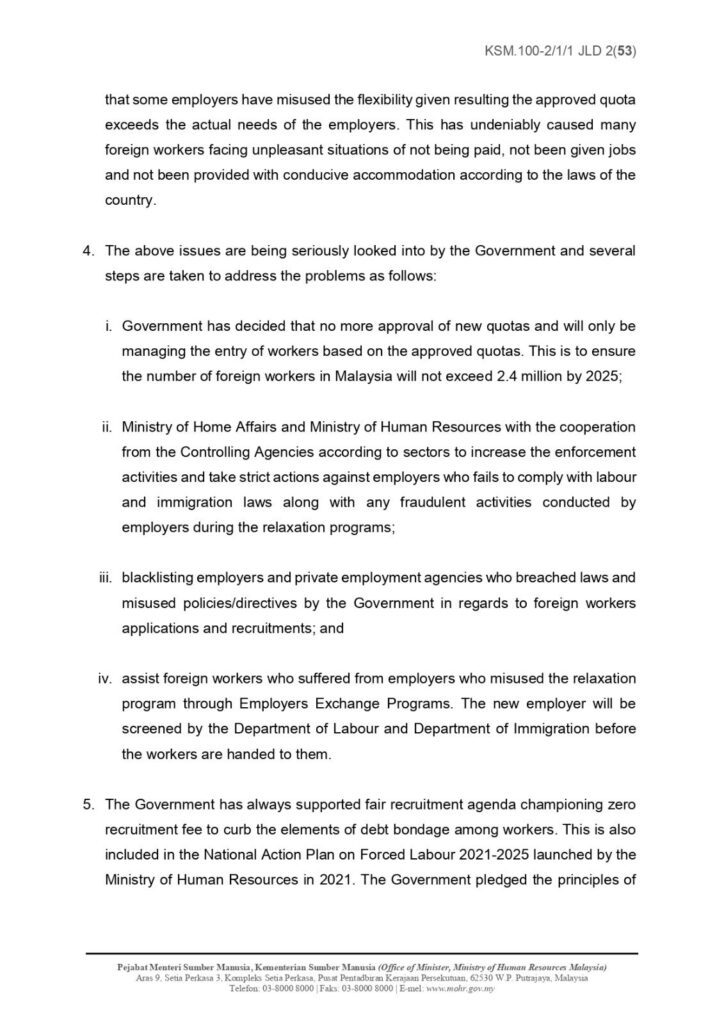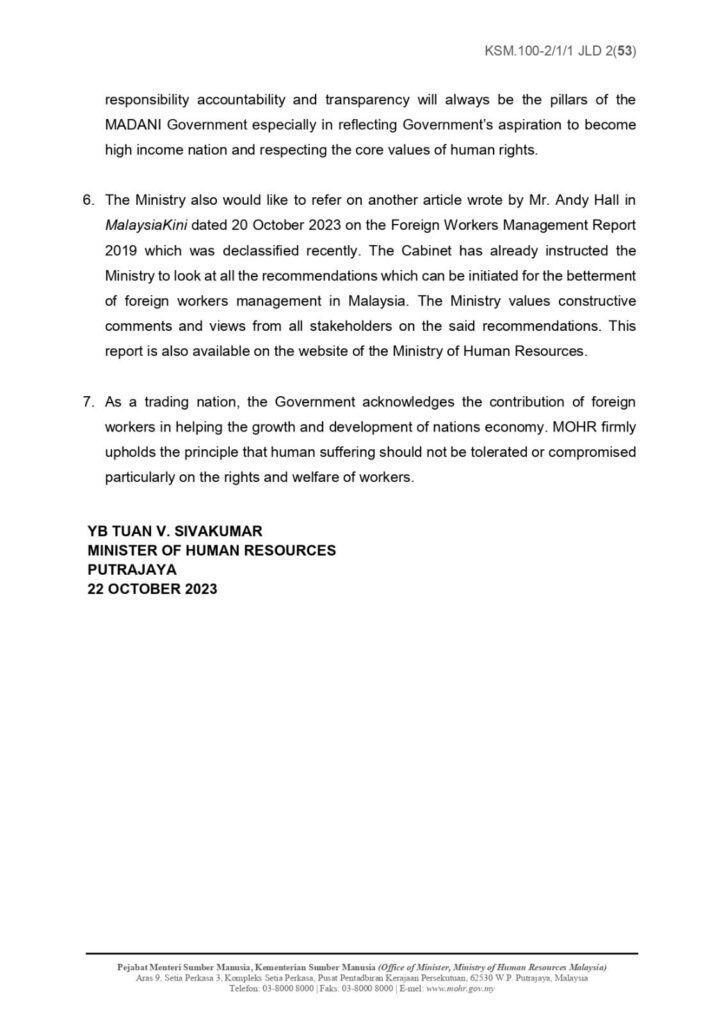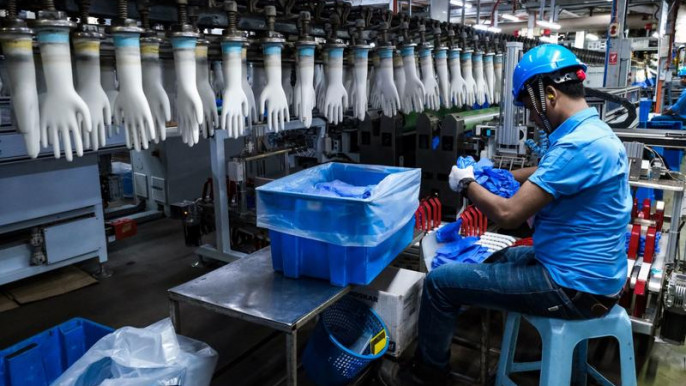Human resources minister: Strict actions against employers who fail to comply with Malaysia’s labour immigration laws regarding an article by Andy Hall
Full Statement: Response from the Ministry of Human Resources in regards to an article by Mr. Andy Hall, International Migrant Workers Rights Specialist
Original source: malaymail – 22nd October 2023.
See also: The Star.
In response to an article by Andy Hall, Human Resource Minister V. Sivakumar said employers and private employment agencies who breached laws and misused policies and directives by the government in regards to foreign workers applications and recruitments would be blacklisted.
KUALA LUMPUR, Oct 22 — The Ministry of Human Resources (MoHR) and the Home Ministry will increase the enforcement activities and take strict actions against employers who fail to comply with labour and immigration laws along with any fraudulent activities conducted by employers during the relaxation programme on hiring migrant workers.
Human Resource Minister V. Sivakumar said employers and private employment agencies who breached laws and misused policies and directives by the government in regards to foreign workers applications and recruitments would be blacklisted.
“The above issues are being seriously looked into by the government and several steps are taken to address the problems.
“We also will assist foreign workers who suffered from employers who misused the relaxation programme through the Employers Exchange Programme and the new employer will be screened by the Department of Labour and Department of Immigration before the workers are handed to them,” he said in a statement today.
Sivakumar was responding to a media report on Thursday that Malaysia is facing a huge excess of foreign workers due to systemic forced labour.
Sivakumar said the government had reviewed the relaxation programme, which had been stopped since March 18, and aware that some employers had misused the flexibility given, resulting in the approved quota exceeding the actual needs of the employers.
“This has undeniably caused many foreign workers to face unpleasant situations of not being paid, not being given jobs and not provided with conducive accommodation according to the laws of the country.
“The government has decided that there will be no more approval for new quotas, and it will only be managing the entry of workers based on the approved quotas, to ensure that the number of foreign workers in Malaysia will not exceed 2.4 million by 2025,” he said.
MoHR would like to clarify that the management of foreign workers in Malaysia is subject to the principle of prioritising local workers and the demand from employers depending on their actual needs based on criteria determined by the government according to sectors, he added.
22nd Oct 2023 Media Statement: Response from the Ministry of Human Resources in relation to an article by Andy Hall
🛑 𝐇𝐄𝐁𝐀𝐇𝐀𝐍 𝐊𝐄𝐍𝐘𝐀𝐓𝐀𝐀𝐍 𝐌𝐄𝐃𝐈𝐀 𝐊𝐒𝐌
Original Source: STAR – 19th October 2023
Original Source: MALAYSIAKINI on 20th October 2023.
Posted at: Facebook.
In response to an article by Andy Hall:
1. The Ministry of Human Resources (MOHR) would like to response on an article from Mr. Andy Hall in Star on 19 October 2023 regarding a situation that Malaysia is facing a huge access of foreign workers due to systemic forced labour through debt bondage contributed by corruption and impunity.
2. MOHR would like to clarify that the management of foreign workers in Malaysia is subject to the principle of prioritizing local workers and the demand from employers depending to their actual needs based on criteria determined by the Government according to sectors.
3. Recently, the Government has relaxed its condition on foreign workers hiring, with the intention to assist the business community towards facilitating business operations taking into consideration the challenging economic environment and post COVID-19 effects. Businesses critical need of workers to support their operations and recovery are made priority by the Government to improve the country’s economic development needs. Although the conditions were relaxed, companies with approvals would have six months to fulfil all the regulatory requirements involved in regards to the employment of foreign workers. However, the relaxation approach is a temporary measure and has been stopped since 18 March 2023. The Government has reviewed the relaxation programme and aware that some employers have misused the flexibility given resulting the approved quota exceeds the actual needs of the employers. This has undeniably caused many foreign workers facing unpleasant situations of not being paid, not been given jobs and not been provided with conducive accommodation according to the laws of the country.
4. The above issues are being seriously looked into by the Government and several steps are taken to address the problems as follows: i. Government has decided that no more approval of new quotas and will only be managing the entry of workers based on the approved quotas. This is to ensure the number of foreign workers in Malaysia will not exceed 2.4 million by 2025; ii. Ministry of Home Affairs and Ministry of Human Resources with the cooperation from the Controlling Agencies according to sectors to increase the enforcement activities and take strict actions against employers who fails to comply with labour and immigration laws along with any fraudulent activities conducted by employers during the relaxation programs; iii. blacklisting employers and private employment agencies who breached laws and misused policies/directives by the Government in regards to foreign workers applications and recruitments; and iv. assist foreign workers who suffered from employers who misused the relaxation program through Employers Exchange Programs. The new employer will be screened by the Department of Labour and Department of Immigration before the workers are handed to them.
5. The Government has always supported fair recruitment agenda championing zero recruitment fee to curb the elements of debt bondage among workers. This is also included in the National Action Plan on Forced Labour 2021-2025 launched by the Ministry of Human Resources in 2021. The Government pledged the principles of responsibility accountability and transparency will always be the pillars of the MADANI Government especially in reflecting Government’s aspiration to become high income nation and respecting the core values of human rights.
6. The Ministry also would like to refer on another article wrote by Mr. Andy Hall in MalaysiaKini dated 20 October 2023 on the Foreign Workers Management Report 2019 which was declassified recently. The Cabinet has already instructed the Ministry to look at all the recommendations which can be initiated for the betterment of foreign workers management in Malaysia. The Ministry values constructive comments and views from all stakeholders on the said recommendations. This report is also available on the website of the Ministry of Human Resources.
7. As a trading nation, the Government acknowledges the contribution of foreign workers in helping the growth and development of nations economy. MOHR firmly upholds the principle that human suffering should not be tolerated or compromised particularly on the rights and welfare of workers.
YB TUAN V. SIVAKUMAR
MINISTER OF HUMAN RESOURCES PUTRAJAYA



20th Oct 2023 Malaysiakini: Long-awaited foreign worker management report declassified in Malaysia (Comments by Andy Hall)
Comments from Andy Hall, independent migrant worker rights specialist, on the key recommendation of the independent committee.
Andy Hall’s Comments:
Obviously, there are many things that need fixing when it comes to the issue of migrant workers in Malaysia.
What more should the government do, and how does that exist alongside these committee recommendations?
There is so much of systemic corruption in the country relating to migration management. What we need is for the prime minister to take control of this issue, as the migration policy needs to be dictated by a prime minister because it is such an important issue for Malaysia. Putting migration under the auspices of the Ministry of Human Resources (MoHR) is naive and impractical, it won’t work on many levels.
You have so many migrant workers, and this needs to be controlled from the top. It cannot be controlled by just the Ministry of Home Affairs (MoHA) because migration has three aspects — national security, economic security and human security. MoHA focuses on national security, so it is not the agency that should be controlling migration.
MoHR, in contrast, focuses on labour and labour protection, not security, health, economics and trade, so it’s not suitable either.
The prime minister needs to take control of this issue and have a task force at the highest level, whereby migration policy is developed.
The whole system of migration policy now is not working and it needs to be taken at the top and coordinated properly in the long term to take into account national, economic and human security issues.
I have always believed the issue must be under the PM’s office or an independent agency tasked with migration management.
Migration management is about human, national and economy security. Health, education, community, safety, jobs, security, so many issues.
Having the issue under ONE lead ministry is a disaster and cannot work. One ministry can be the secretariat for sure, but migration should be under the PM’s office.
The recommendation of the committee to place migration under the MoHR is impractical, naive and will not address the systemic governance and corruption issues that continue to plague migration, as a crucial area of public policy.
Long-awaited foreign worker management report declassified
Original source: Malaysiakini by S Vinothaa – 19th October 2023.
A confidential report regarding the Management of Foreign Workers, prepared by an independent committee and initially withheld from public access in early 2019, has now surfaced on the Human Resources Ministry’s website without any formal declaration of its declassification.
Sources in the ministry revealed that ‘The Report of the Independent Committee on the Management of Foreign Workers’ was published on Oct 13 with the government appearing to have yielded to repeated calls for its declassification over the years.
The latest and most significant call to declassify the report came this May, from the members of the committee itself who pointed out that the problems and issues identified by them seemed to continue unabated.
The 11-member committee set up in 2018 under the first Pakatan Harapan cabinet was led by former Court of Appeals judge Mohd Hishamuddin Yunus.
It was reported that the committee’s preliminary finding was handed over to the then-home minister Muhyiddin Yassin and later the full report was submitted to the Cabinet in May 2019.
Overt and blatant dishonesty
One of the report’s most glaring revelations pertains to the unequivocal identification of corrupt practices which it described as “overt and blatant”.
“The most absurd of these corrupt practices must be the questionable and non-transparent appointments of recruitment agencies or outsourcing entities for sourcing foreign workers.
“Many of these entities had been established specifically to undertake the activities granted even though it is obvious they do not have previous experience and track record in such a business.
“These firms are purportedly associated with politicians, serving members of the legislature or other branches of government or their family members, former government officials, and other proxies of these groups,” reads the report.
Home Minister Saifuddin Nasution Ismail
Yesterday, Home Minister Saifuddin Nasution Ismail revealed that the country had an oversupply of 120,000 foreign workers in the service sector and 147,213 workers manufacturing sector.
Saifuddin admitted to elements of work permit abuse with the highest rate (of non-compliance) in the service sector.
The report was concerned that such corrupt practices that led to the escalation of costs and had adverse effects on workers, were the foundation and principal cause that kept them bound to continuously trying to settle their accumulated debt.
It points out that forced labour conditions provide the trigger for foreign workers to escape their predicament and inadvertently become undocumented individuals.
Corruption hiding in plain sight
Although the report does not name entities or individuals, it points out that there was a layer of corruption hiding behind seemingly legitimate business practices.
It revealed the practice of non-transparent outsourcing of public sector functions to preferential companies for jobs like providing biometric information, renewal of employment passes, and periodical health screening.
These were jobs previously undertaken by the Home Ministry, the Human Resources Ministry, and other relevant government agencies.
Significant structural change
The report boldly uncovers the gaps in the current system and identifies policy recommendations to the government, from recruitment and repatriation to foreign workers’ rights to redress.
However, its recommendation for the Human Resources Ministry to be the single authority to formulate and implement policies that govern the management of foreign workers in the country could prove to be the most significant structural change if implemented.
“The Human Resources Ministry is best placed to take on this role as its mandate already involves expediting the labour market needs of the economy and oversight of industry’s compliance,” the report reads.
To bring about this change, the government would need to review and repeal, among other policies, a cabinet committee decision on foreign workers and illegal immigrants from 2005 when the final authority was handed to the Home Ministry.
Through a National Foreign Workers Management System (NFWMS), the committee recommended that the ministry would be able to develop an integrated end-to-end single online system to administer all aspects of foreign workers management.
“This NFWCMS will remove the inefficiencies and unnecessary processes stemming from the current mix of manual, face-to-face, multiple electronic, and discretionary procedures.
“More importantly, the integration and digitalisation of currently outsourced processes and procedures will remove all forms of corruption, rent-seeking, monopoly, and market capture from the preferential appointment of service providers,” it said.
Article by Andy Hall below:
19th Oct 2023: Malaysia facing huge excess of 1/4 million migrant laborers
Andy Hall’s Article: Malaysia facing huge excess of 1/4 million migrant laborers
Systemic forced labour through debt-bondage is the result of this corruption and impunity (Comments by Andy Hall)
Andy Hall – See also: 19th Oct 2023: Malaysia facing huge excess of 1/4 million migrant laborers
Malaysia is facing an excess of a 1/4 million migrant laborers. Malaysia’s systemic and official corruption and impunity and total lack of rule of law has for the most part led to this situation arising in the first place. This all at a time when recruitment-related fees and costs for vulnerable and desperate migrant workers to come to work in Malaysia have doubled and in some cases tripled since the Anwar administration removed almost all conditions on hiring migrant workers at the end of 2022.
Bangladeshi workers in particular have migrated into Malaysia in record numbers recently, utilising an alleged recruitment syndicate, at costs of up to US$6,000 per person only to face unemployment, destitution and physical and mental abuse.
These indebted migrant workers have loans increasing with exorbitant interest rates in their source countries every day, and now they are too often without work and income to pay off these staggering debts. This leads to a situation of systemic forced labour and modern slavery through debt bondage.
Thousands of bogus Malaysian employers are behind this oversupply, essentially irregular Malaysian companies without operations or recruitment licenses requiring migrant workers, who work with corrupt officials to fake migrant quota documents to bring in workers to simply make money. In addition, often fake ‘cleaning companies’ are behind this systemic abuse. Workers are hired as cleaners and essentially outsourced for any employers desperate for a short term workforce, even though outsourcing of migrant laborers in Malaysia has been illegal since 2019.
The vulnerable and desperate migrant workers or victims impacted here remain unsupported, and in too many cases, even when asking for support as victims of modern slavery, end up instead arrested, extorted, tortured and then released as they fall into the net of corrupt Malaysian law enforcement officials that just feed of their vulnerability and often irregular status. Very distressing situation indeed.
Huge excess of migrant labour
Original source: The Star – Martin Carvalho – 19th October 2023.
KUALA LUMPUR: Relaxing regulations on the hiring of foreign workers and the recalibration exercise led to an excess of over 250,000 migrant laborers in the manufacturing and service sectors, the Home Minister said.
Datuk Seri Saifuddin Nasution said this was based on an analysis of the number of foreign workers in the country compared with the labour needs forecast in five main sectors.
He said as of Oct 9, a total of 667,418 foreign workers had come in, compared to the forecast of 518,000 based on the relaxation and recalibration programme.
The minister said based on an analysis by the joint committee on the management of foreign workers, there was an oversupply of foreign workers in the services sector.
Sizeable surplus: Saifuddin and Sivakumar holding a joint press conference in KL. — RAJA FAISAL HISHAN/The Star
“It was forecast that there would be 20,000 foreign workers in the service sector, but there are 142,204 in it.
“The forecast for factories was for 50,000 foreign workers but there are 197,213 of them,” he said after a meeting of the joint committee on the management of foreign workers yesterday with Human Resources Minister V. Sivakumar.
Saifuddin Nasution said the situation was, however, not quite the same for the construction, plantation and agriculture sectors, which still lacked the required number of foreign workers, adding that there were 220,230 of them in construction against the 301,000 forecast for the sector.
In agriculture, there were 53,648 foreign workers, against the 90,000 needed.
In the plantation sector, 52,123 foreign workers were employed, but this was still short of the 57,000 needed, the minister added.
“From this data, we see that three sectors are experiencing a deficit while two others are enjoying a surplus,” he said.
He said presently, there were 1.7 million legal foreign workers in the country.
“In managing foreign workers, we are bound by the Economic Planning Unit’s policy that their number cannot exceed 2.4 million by 2025.
“As such, the relaxation plan ended in March this year and the recalibration programme will end on Dec 31. This means that there will be no more intake of foreign workers except those approved under the quota,” he said.
Some 800,000 foreign workers were under verification following the relaxation and recalibration programmes, he added.
Asked why there was an oversupply of foreign workers in the service sector, Saifuddin did not rule out an abuse of work permits by employers.
“It is unreasonable for me to say that there is no abuse of worker permits, but it is not to the extent that there was total non-compliance with the regulations,” he explained.
He said these workers in the service sector included cleaners and workers in laundries, resorts, spas, reflexology centres, scrap yards and cargo caddies, among others.
Saifuddin Nasution said the service sector was also found to be at high risk of non-compliance with regulations involving worker accommodation, working hours, and payment of salary.
“I urge employers to adhere to the regulations. Investigations will be done on the ground by the relevant agencies, and investigation papers will be opened.
“Action will be taken if regulations are breached, which could result in court prosecution,” he said.
Meanwhile, Saifuddin Nasution reminded employers in the respective sectors of the Dec 31 deadline for the recalibration exercise under the Labour Recalibration Programme (RTK 2.0).
“After which, the next three months until March will be for the verification process,” he said.
The first RTK 1.0, which ran from November 2020 to Dec 31 last year, saw 418,649 undocumented migrants registered, involving 30,137 employers.
The government had also previously announced a programme to ease the regulations on the entry of foreign workers from January to March this year.
Let excess workers move elsewhere, says MEF
The Star – 21st October 2023
PETALING JAYA: The construction, plantation and agriculture sectors are still in need of foreign labour, while mamak restaurants, hairdressers, jewellers and textile merchants are also crying out for more specialised workers from abroad.
Meanwhile, there is an excess of over 250,000 foreign workers in the manufacturing and services sectors.
The Malaysian Employers Federation, saying that there has been a miscalculation in the forecast of employees needed, now wants the excess workers to be transferred to sectors where there is a shortage.
Its president Datuk Dr Syed Hussain Syed Husman said that while there may be oversupply in some sectors as mentioned by Home Minister Datuk Seri Saifuddin Nasution Ismail, there was still a shortage of foreign workers in other sectors, especially in plantation and construction.
“Instead of bringing in new foreign workers, the government should allow the foreign workers not required by some sectors to be employed elsewhere.
He also said those who had brought in workers should be compensated.
“No employer wants to spend RM25,000 to bring in a foreign worker when they really do not need them. It is more of a wrong forecast.
“The government should assist such employers recover some of the costs they incurred by allowing the surplus workers to be employed in needy sectors.”
He said the rules tying foreign workers’ approval to a particular industry and employer should be reviewed.
“Under existing rules, the current employer needs to end the employment of the extra foreign workers.
“The authorities can then decide to send him back or allow him to remain and be employed by other employers within or outside the sector.
“They should instead be offered work in available sectors. If they refuse to work in the new sector, then they should be repatriated,” Syed Hussain said.
On Wednesday, Saifuddin said that relaxing regulations on foreign workers and a recalibration exercise have led to an excess of over 250,000 foreign workers in the manufacturing and services sectors.
Syed Hussain felt there was no oversupply of foreign workers.
“The Home Minister’s assessment may be based on the approved quota, not the actual number of legal foreign workers in the country.
Malaysian Muslim Restaurant Owners Association secretary-general Habebur Rahman Shahul Hameed concurred, saying mamak restaurants were still in need of workers.
See more: 20th Oct 2023 Malaysiakini: Long-awaited foreign worker management report declassified in Malaysia.
See more: 19th Oct 2023: Malaysia facing huge excess of 1/4 million migrant laborers.
See more: 2nd Oct 2023: Exploitation of migrant workers continues unabated in Malaysia.


